At the LGBTIQA+ Speaker Series’ 12th year at the UNC LGBTQ Center, the goal is for graduate and undergraduate students alike to learn and grow from the presentations and discussions proposed.
The LGBTQ Center is designed to be a safe place for open discussion about LGBTQ+ issues. Graduate and professional students across all disciplines doing research on gender topics and sexual orientation are invited to be presenters in the LGBTIQA+ Speaker Series.
The series is open to the general public, regardless of the presenters' or audiences' sexual orientation or gender identity. Graduate students write dissertations and conduct research that can be presented to an academic audience. However, when it comes to LGBTQ+ research, some students see a space like the LGBTQ Center as a more inviting and better place to practice. The LGBTQ+ series was started in 2007, and it has continued to grow and change under the leadership of Terri Phoenix.
Phoenix, the director of the LGBTQ Center at UNC, said the series was created so that people doing LGBTQ+ research could come together in an inclusive and safe place. The series is but one of the goals and initiatives of the LGBTQ Center.
“I really want to create a community of people who are both creating and consuming research about LGBTIQA people,” Phoenix said.
Graduate student Kimberly Pentel, who has presented in the series, is both consuming and creating this type of research. She said the series had a personal interest for her as a bisexual woman.
“It was really good professional practice to figure out how I can pitch the work that I am doing within clinical psychology to a broader audience, and to start to connect and network with other graduate students and faculty who are interested in hearing about LGBTQ+ research that is going on around campus,” Pentel said.
Pentel is a doctoral student who works in Don Baucom's UNC Couples Lab. Her research specifically focuses on couples therapy for same-sex partners. Pentel gave a presentation about her research, called “When the Political Becomes Personal: Discussing LGBTQ+ Issues and Politics in Therapy.”
The research emphasized how the political spectrum can enter the therapist’s office. During her presentation, Pentel broadened this so it not only applied to therapists, but to students and professors as well. Pentel said she hopes that her work is increasing LGBTQ+ visibility and discussion about these issues.




